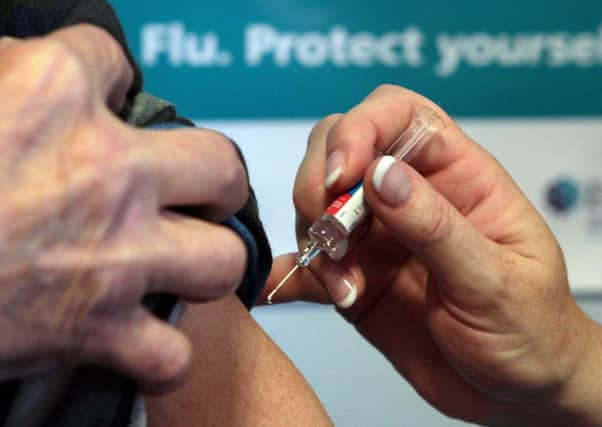Trust fights flu this season


The Trust aims to reduce the spread of flu this season by vaccinating as many frontline staff as possible. It is joining the national NHS flu fighter staff vaccination campaign, which supports Trusts in England to help them improve staff flu vaccination uptake.
Last year the flu season claimed the lives of 107 people in the UK and affected thousands more.
Advertisement
Hide AdAdvertisement
Hide AdThe Trust takes patient safety very seriously and will be working hard to encourage its nurses, doctors and other frontline staff to get vaccinated – helping to prevent them from catching flu or passing the virus on to patients.
The vaccinations will be provided free of charge at a range of times and locations to suit all frontline staff, including night workers and those out in the community.
Dr Neil Pease, director of organisational development and workforce, said: “We have made great strides over the last two years in increasing the number of frontline staff who have rolled up their sleeves and had the jab. This is something we want to build on this year, with our vaccinators more visible than ever before on our wards and departments.”
In 2012/13 35.5 per cent of frontline staff at the Trust were vaccinated and last year 2013/14 65 per cent of staff had their jab.
Advertisement
Hide AdAdvertisement
Hide AdDean Royles, chief executive of the NHS Employers organisation, said: “Flu targets people who are weakened and vulnerable, so it’s crucial the NHS does everything it can to keep the virus away from patients. By having our vaccinations we protect ourselves, our patients, our friends and our family.
“At the moment about half of all NHS staff are vaccinated, which already makes a big difference, and further increases will be exponentially more beneficial. It takes time to change the habits of a vast workforce and it’s important to remember that vaccinations are entirely voluntary - but 108,000 more staff are getting vaccinated compared to only two years ago and support from organisations like Northern Lincolnshire and Goole NHS Foundation Trust, and their staff, means we can aim even higher this year.”
He said the NHS flu fighter campaign, now in its third year, aims to raise awareness about the benefits of vaccination against flu and educates staff about the availability of the free vaccine. Flu jabs for NHS staff are not compulsory, so can only be given to those who request them.
Over the past two years the national campaign has helped increase, by 108,000, the number of frontline NHS staff in England who are vaccinated – from 34.7 per cent of all frontline staff in 2010/11 to 44.6 in 2011/12 and 45.6 in 2012/13.
Advertisement
Hide AdAdvertisement
Hide AdAlthough this campaign is about staff vaccinations, the NHS also offers vaccinations to patients. Those people who can get the can get the flu jab free of charge on the NHS from their GP include:
· Pregnant women
· Anyone with a long-term condition including diabetes, asthma, kidney disease or heart or chest problems
· People undergoing medical treatment who may have a compromised immune system
· People with a neurological condition such as multiple sclerosis (MS) or cerebral palsy
· And everyone over the age of 65.
Advertisement
Hide AdAdvertisement
Hide AdFor those people who think they have the flu, the symptoms usually peak after two to three days and you should begin to feel much better within five to eight days. However, you may have a lingering cough and still feel very tired for a further two to three weeks.
Flu can give you any of these symptoms:
· Sudden fever – a temperature of 38°C (100.4°F) or above
· Dry, chesty cough
· Headache
· Tiredness
· Chills
· Aching muscles
· Limb or joint pain
· Diarrhoea or upset stomach
· Sore throat
· Runny or blocked nose
· Sneezing
· Loss of appetite
· Difficulty sleeping.
If you are otherwise fit and healthy, there is usually no need to visit your GP if you have flu-like symptoms. The best remedy is to rest at home, keep warm and drink plenty of water to avoid dehydration. You can take paracetamol or ibuprofen to lower a high temperature and relieve aches.